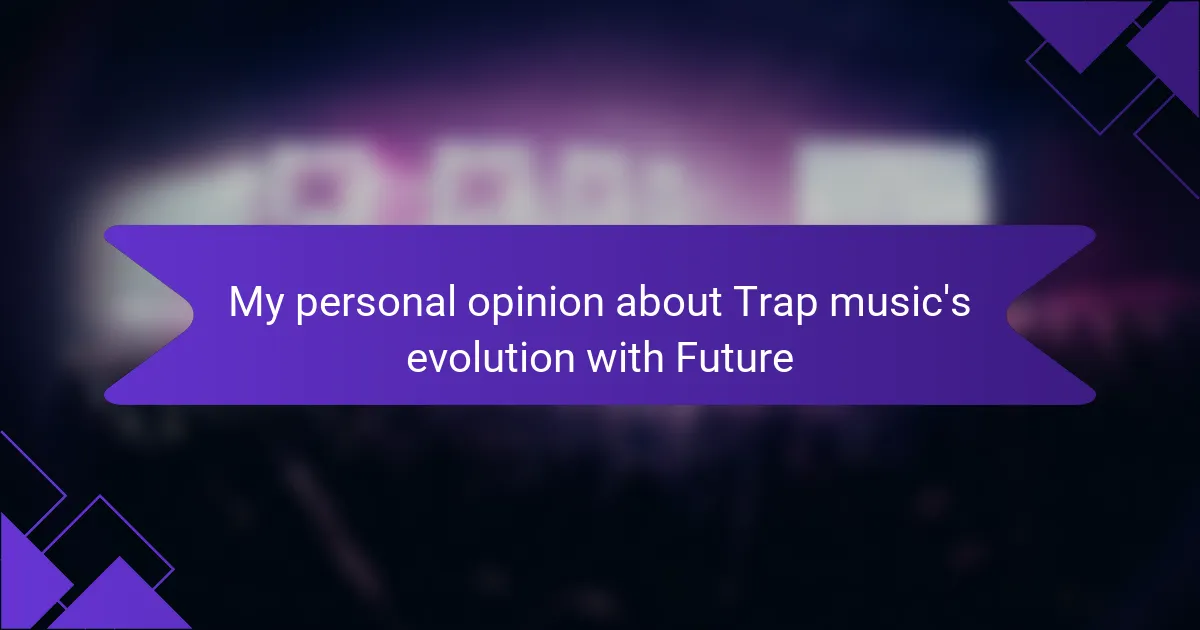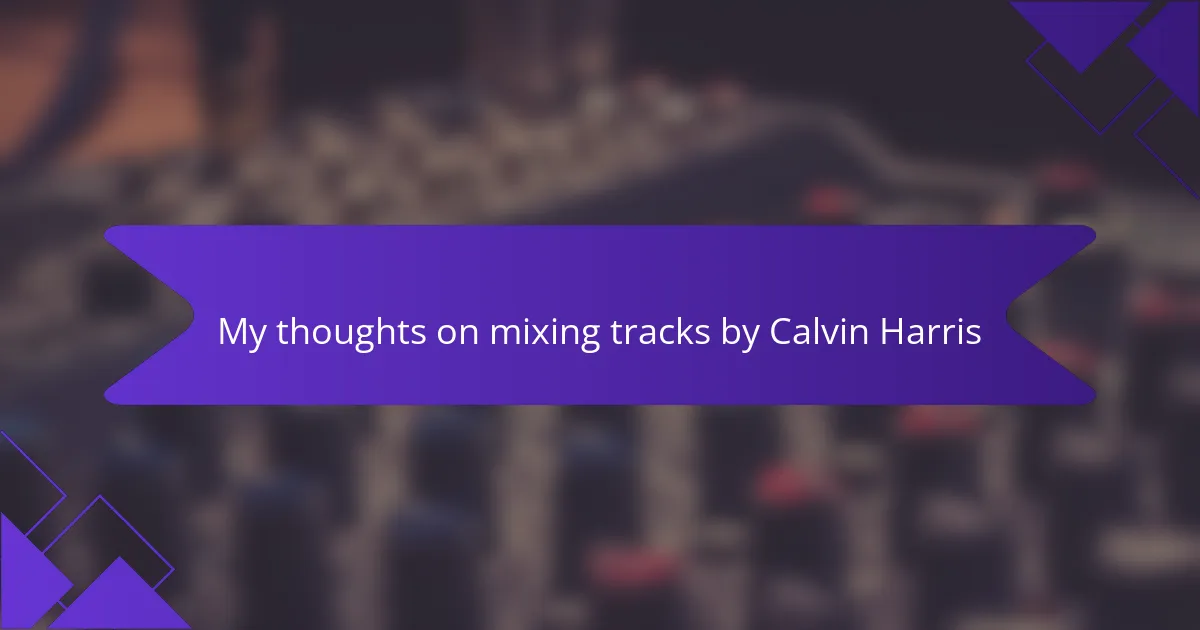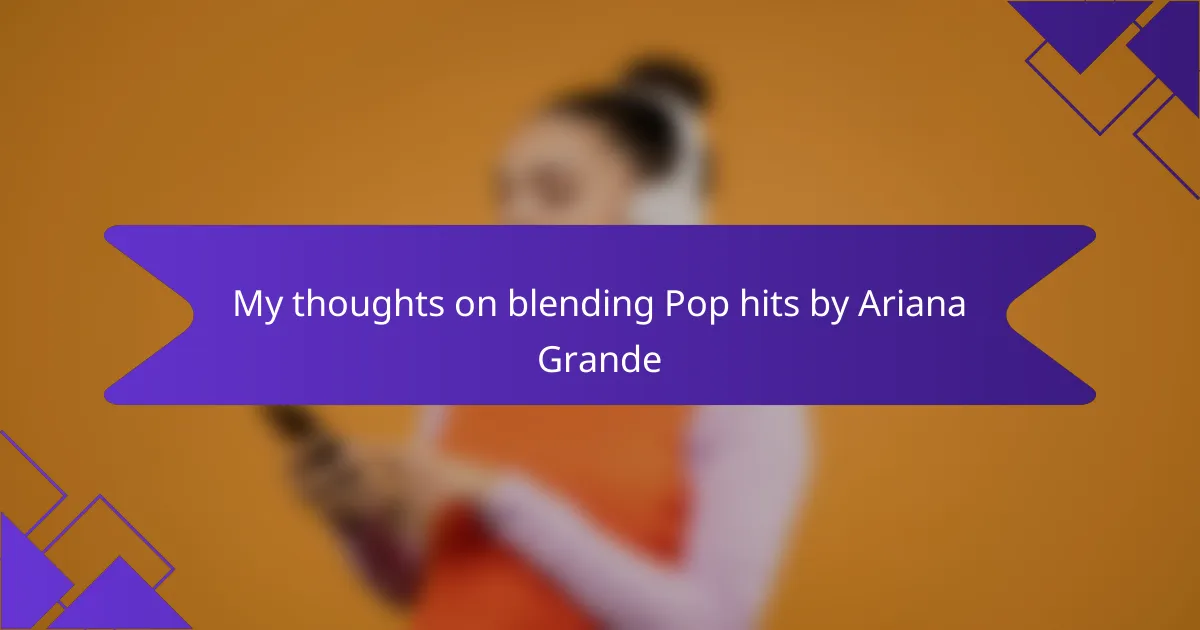Key takeaways
- DJ entertainment goes beyond playing songs; it involves creating an immersive experience that resonates emotionally with the audience.
- Understanding music history, especially the influence of artists like Elvis Presley and Chuck Berry, enriches a DJ’s sets and allows for deeper audience connections.
- Incorporating classic tracks into modern DJ sets can create dynamic energy and evoke nostalgia, enhancing the event’s atmosphere.
- Effective transitions and strategic song choices, such as mixing Elvis’s hits with contemporary tracks, can significantly elevate audience engagement.
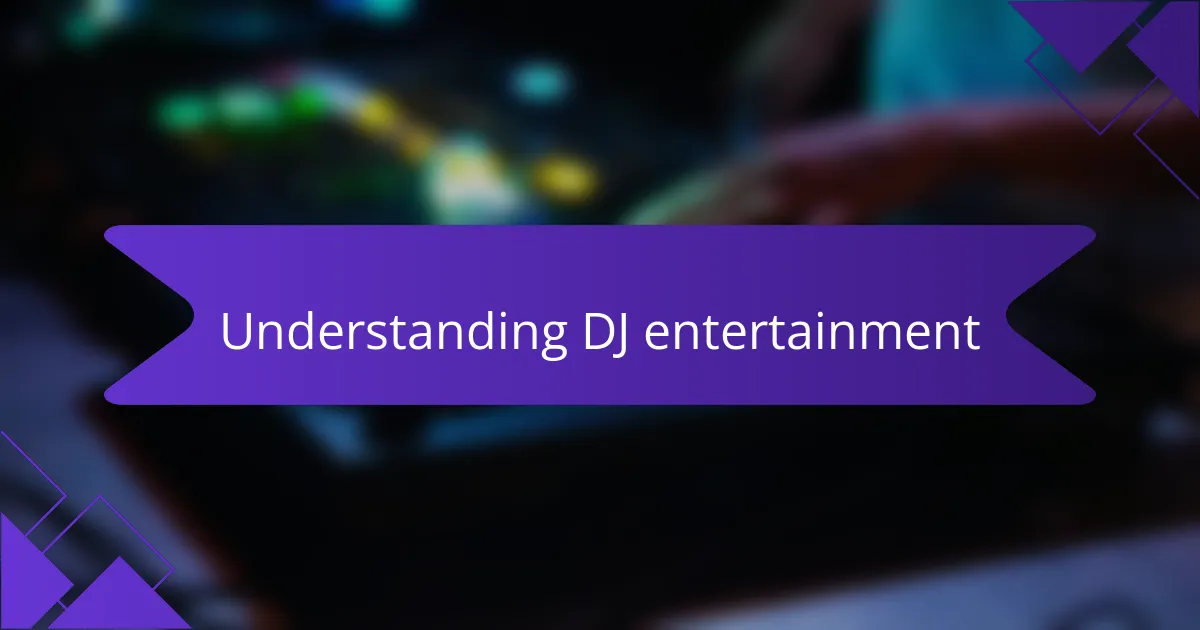
Understanding DJ Entertainment
DJ entertainment is a dynamic field that merges artistry with technology, allowing music lovers to experience tracks in unique ways. When I first started exploring DJing, I noticed how important it is to read the crowd and create an atmosphere that resonates. It’s more than just playing songs; it’s about crafting a journey that can evoke emotions and spark memories.
Understanding the evolution of music, starting with legends like Elvis Presley, helps DJs appreciate the roots of today’s genres. I recall being fascinated by how Elvis broke barriers with his blend of rock and rhythm, inspiring countless artists, including those I spin for today. This historical context not only enriches my sets but also allows me to connect deeper with the audience’s experience.
Here’s a comparison table that illustrates key elements of DJ entertainment and music history:
| Aspect | DJ Entertainment | Music History (Elvis Presley Era) |
|---|---|---|
| Performance Style | Live mixing and crowd engagement | Solo performances with band |
| Technology | Digital software and turntables | Vinyl records and live instruments |
| Audience Interaction | Real-time music selection | Pre-selected setlist |
| Influence | Eclectic musical influences | Rock and Rhythm & Blues foundation |
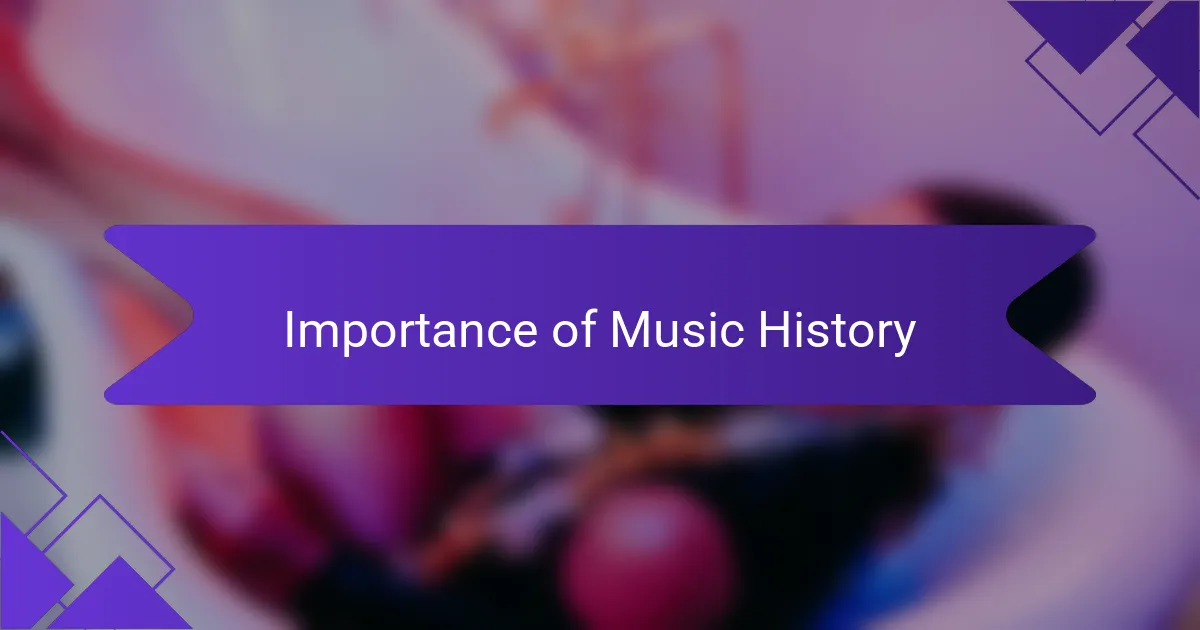
Importance of Music History
Understanding music history is crucial for any DJ, as it shapes our present soundscapes and influences future trends. For me, diving into the eras that preceded my favorite artists, like Elvis Presley, illuminates why music resonates so powerfully today. The evolution from rock ‘n’ roll to modern genres not only reveals how styles blend but also highlights the cultural shifts that inspired these sounds.
I’ve often found that tracing the roots of a track can elevate its significance. For example, learning about Elvis’s impact on race relations and how he brought together diverse musical influences inspires me every time I spin a record. It’s a reminder that music is more than just beats; it’s a narrative threaded through time.
Here are some key reasons why understanding music history is essential:
- Cultural Context: Recognizes the social and political influences that shape musical movements.
- Genre Evolution: Tracks how musical styles transform and influence each other.
- Informed Choices: Helps DJs select tracks that resonate deeper with their audience.
- Creative Inspiration: Sparks new ideas by connecting past influences with contemporary sounds.
- Engagement: Enables meaningful conversations with fans about the music’s heritage.
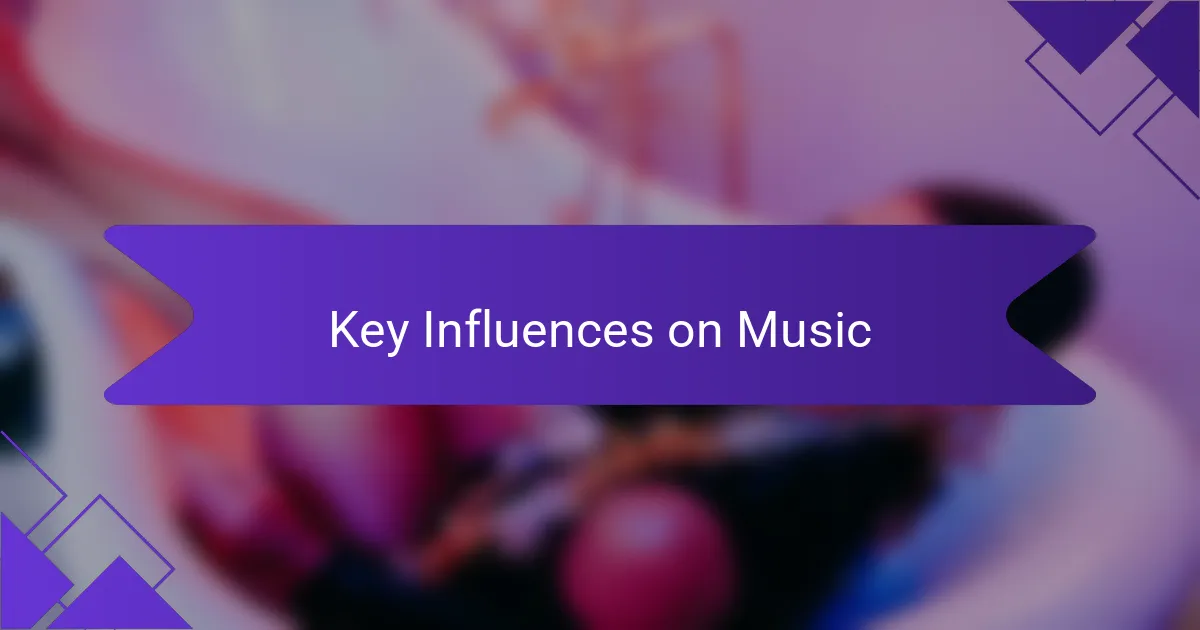
Key Influences on Music
When I think about the key influences on music, Elvis Presley stands out as a game changer. His unique blend of R&B, country, and gospel not only redefined rock and roll but also opened doors for countless artists. I remember listening to his smooth voice and energetic performances, and it sparked my love for music history—how every note he sang echoed the sounds of the past while paving the way for the future.
Another major influence is Chuck Berry, whose guitar riffs and storytelling style shaped not just rock music but also the way artists interact with their audiences. I often find myself marveling at how his music still resonates today, capturing the spirit of youth and rebellion. The rhythm and energy in his songs remind me of the excitement I feel when I’m behind the turntables at a DJ event.
Here’s a comparison of key figures who shaped the music landscape:
| Artist | Influence |
|---|---|
| Elvis Presley | Revolutionized rock and roll; blended genres; inspired future artists |
| Chuck Berry | Pioneered rock guitar; influenced performance styles; encapsulated youth culture |
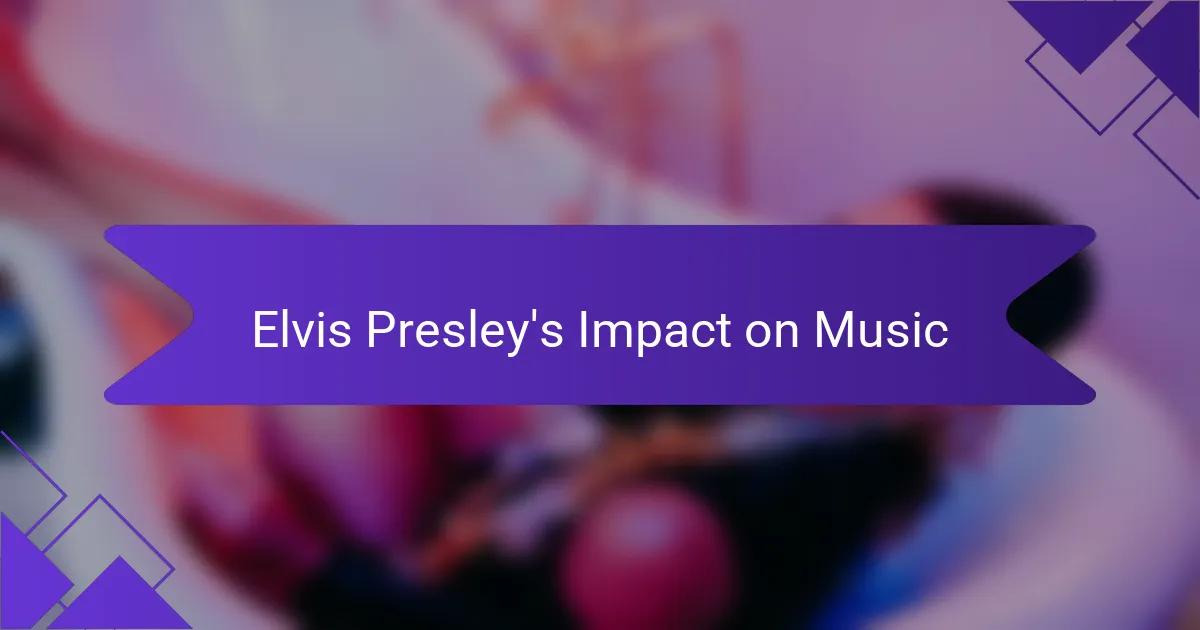
Elvis Presley’s Impact on Music
Elvis Presley’s impact on music is staggering and truly profound. His unique blend of rock, country, and rhythm and blues not only revolutionized the music scene but also helped shape the identity of the genre itself. I remember listening to “Jailhouse Rock” for the first time; the energy and rhythm were contagious, sparking my love for rock ‘n’ roll.
One of the most remarkable aspects of Elvis was his ability to break down racial barriers in music. By embracing influences from African American artists, he brought a diverse sound to mainstream audiences. I find it inspiring how he became a cultural icon, demonstrating that music could transcend prejudice and connect people from different backgrounds.
Here’s a comparison table to illustrate his influence alongside some other music legends:
| Artist | Impact on Music |
|---|---|
| Elvis Presley | Integrated rock and roll into mainstream culture, bridged racial divides, influenced countless artists |
| The Beatles | Revolutionized pop music, experimented with studio techniques, inspired social and cultural movements |
| Chuck Berry | Defined early rock and roll sound, emphasized guitar riffs, influenced generations of musicians |
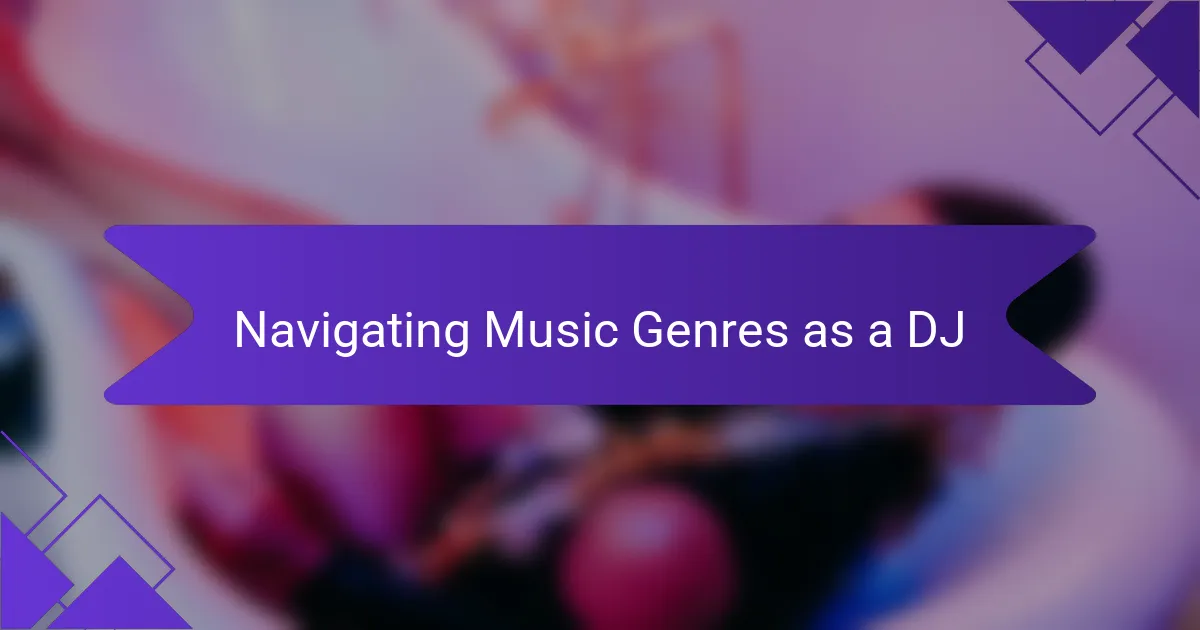
Navigating Music Genres as a DJ
As a DJ, navigating music genres is crucial to shaping the energy of any event. I remember my early days, spinning records at local clubs, where the mix of rock ’n’ roll passion from Elvis Presley would suddenly give way to the infectious rhythms of disco. This fluidity not only reflects musical evolution but also keeps the dance floor alive.
Understanding genres like rock, disco, and hip-hop fuels creativity in my sets. For instance, blending Elvis’s rock sounds with modern beats can create a nostalgic yet fresh atmosphere. That’s the beauty of being a DJ; I get to remix the past with the present, igniting sparks of joy and connection among listeners.
| Genre | Key Characteristics |
|---|---|
| Rock | Strong beats, electric guitar, and emotive vocals |
| Disco | Upbeat tempo, orchestral arrangements, and dance rhythms |
| Hip-Hop | Rhythmic vocal delivery, turntablism, and sampling |
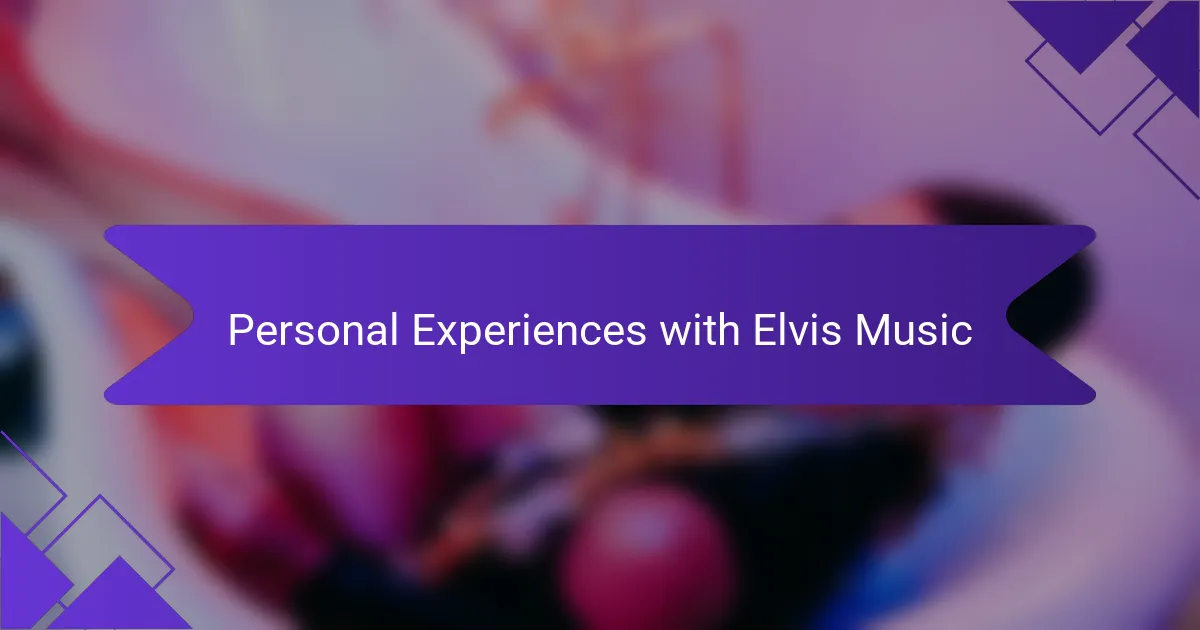
Personal Experiences with Elvis Music
Elvis Presley’s music has always held a special place in my heart. I vividly remember my first encounter with his song “Can’t Help Falling in Love.” The melody swept me away, evoking a whirlwind of emotions. It’s fascinating how a single song can transport you to a different time, making you feel like you’re dancing under a shimmering disco ball, even if you’re in your living room.
I often think about the way my friends and I would gather around a record player, flipping through vinyl albums just to find that one Elvis track that ignited our enthusiasm. Those moments were filled with laughter, sing-alongs, and a sense of camaraderie that only his music could create. It’s remarkable how his voice echoed our youthful dreams and aspirations, tying us together through a shared experience of joy.
What strikes me most is the timeless relevance of his songs. When I play “Hound Dog,” it instantly energizes the crowd, reminding me of how powerful music can be in uniting people. In those moments, I find myself reflecting on how Elvis transcended generations, leaving a legacy that continues to inspire and uplift us all. Isn’t it incredible to think about the connections we forge through the universal language of music?
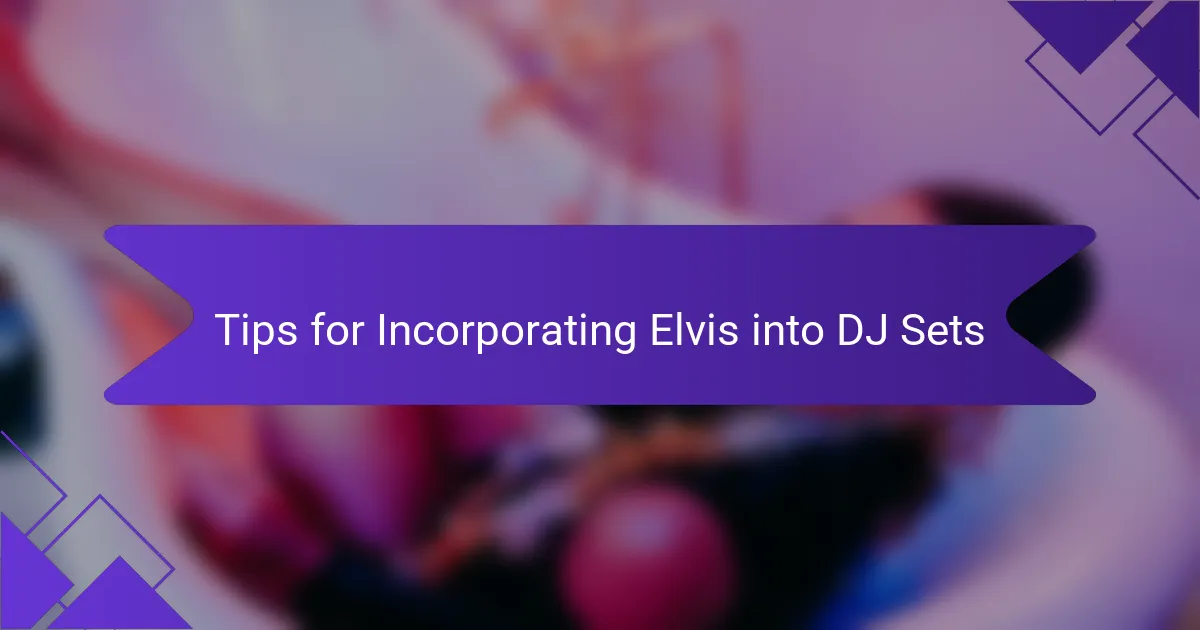
Tips for Incorporating Elvis into DJ Sets
Incorporating Elvis into DJ sets can add a vibrant touch that really engages the audience. One effective approach I’ve found is seamlessly blending his classics with contemporary hits. For example, mixing “Jailhouse Rock” into a set featuring current pop or hip-hop tracks can create a dynamic contrast. It truly brings an electrifying energy to the dance floor, reminding everyone why Elvis is a timeless icon.
Another tip is to use Elvis’s music for memorable moments during an event. I recall one night when I dropped “Can’t Help Falling in Love” during a slow dance segment. The atmosphere shifted instantly; couples swayed while nostalgia washed over the room. It’s about choosing the right moments where his songs can evoke strong emotional responses. These are the times that people talk about long after the event is over.
Don’t underestimate the power of transitions either. I often create a build-up from a hard-hitting dance track into an Elvis tune, using creative sound effects to ease the switch. It’s amazing how well audiences respond to this kind of layering. Have you tried it? When done right, it feels like a refreshing breath of air that revitalizes the vibe, keeping the crowd fully engaged.
